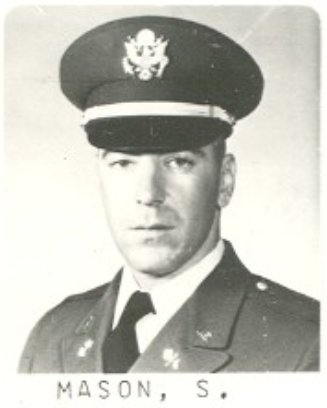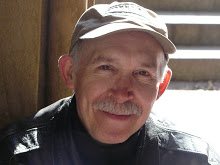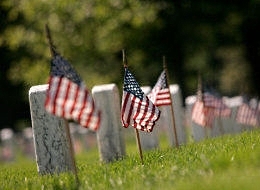The following has been consolidated from multiple sources, and has been corrected along the way by the various Army Signal OCS Officers that researched Candidate Mason’s life. In the process, changes to the information published in public records have been made. That is, we here at the Army Signal OCS Association have made changes or comments to the information record below where we felt the data in the public files was incorrect about Candidate Mason’s unique life. If you find any errors in our text, please be so kind as to let us know so that we can correct this mini-biography.
Beginning at the beginning, the Army Signal OCS Association’s records show that Candidate Mason was born on February 29, 1940, in Brooklyn, New York. From there the story unfolds as follows:
![]()
![]()
 Stephen R. Mason
(4-66)
Stephen R. Mason
(4-66)
From an eMail received from MAJ (R) Richard Green, on April 22, 2013:
John McDougle (Army Signal OCS Class 04-66) asked me what the association had on the death of Stephen Mason, and the answer was not much... just the SSDI listing of his date of birth, date of death, place of birth and place of death... but I told John I'd see what I could find... I'm glad John asked...
I found this at Wikipedia... (note that the year of birth is incorrect, as he died in 2005 and is listed as 65 years old... so that would be 1940, not 1949 as reported...
From Wikipedia — Steve Mason (1940 in Brooklyn, New York – May 25, 2005) was a decorated United States American combat veteran of the Vietnam War and a critically acclaimed poet. His poem "The Wall Within" was read at the 1984 dedication of the Vietnam Veterans Memorial in Wash, D.C. and has the distinction of being the only American work of poetry on display at the war memorial in Hanoi.
The author of four books, The Moths & Violets of Vito & Me: The Story of a Poem, Johnny's Song, Warrior for Peace, and The Human Being: A Warrior's Journey Toward Peace and Mutual Healing, his poetry related to his experiences as a Captain in the United States Army during the Vietnam War.
His work was hailed by veterans and their families nationwide. In addition to being the poet laureate of the Vietnam Veterans of America, he worked for veterans' causes. Diagnosed with lung cancer as a result of exposure to Agent Orange during the war, he became a participant and active advocate for the Oregon Death with Dignity Act and spoke at the California State Assembly for a similar law proposed in that state. He died at his home in Ashland, Oregon, at the age of 65. He is survived by four children.
- - - - -
 Additional research on MAJ Green’s part
disclosed the following:
Additional research on MAJ Green’s part
disclosed the following:
May 29, 2005 | Myrna Oliver | Times Staff Writer
Steve Mason, considered the poet laureate of the Vietnam Veterans of America, whose searching blank verse was read at the dedication of the Vietnam Veterans Memorial in Washington, has died. He was 65. Mason died of lung cancer Wednesday at his home in Ashland, Ore.
California Assemblywoman Patty Berg, who on Friday requested that the Assembly adjourn in his honor, said that although Mason was a proponent of Oregon's Death with Dignity Act and had qualified for a lethal dose of barbiturates, he did not hasten his death.
Mason, who had lived in San Diego before returning to Ashland last year, testified in February before the Assembly Committee on Aging and Long-Term Care on behalf of a bill proposed by Berg, (D-Eureka), and Assemblyman Lloyd Levine, (D-Van Nuys,) to allow doctors to prescribe medication enabling terminally ill patients to hasten their own death. Oregon is now the only state with such a law.
"This isn't suicide," Mason told Time magazine in April when he described his legal acquisition of the Nembutal he never used. "I've lived my life with dignity. I want to go out the same way."
Never embittered by his service in Vietnam, Mason nonetheless struggled to make sense of his year of combat duty. Poetry became his method of expression.
"The Wall Within" was presented at the 1984 dedication of the Vietnam Memorial -- a long wall inscribed with the names of those who died in the war -- and was read into the Congressional Record.
It said in part:
 Most real men
Most real men
Hanging tough
In their early forties
Would like the rest of us to think
They could really handle one more war
And two more women.
But I know better.
You have no more lies to tell.
I have no more dreams to believe.
Mason published three well-received books of poetry, "Johnny's Song: Poetry of a Vietnam Veteran" in 1986, "Warrior for Peace" in 1988 and "The Human Being -- A Warrior's Journey Toward Peace and Mutual Healing" in 1990. He also co-wrote with Joan Mahan a 1974 volume of love poems, "Moths and Violets of Vito and Me." The former soldier combined everyday words and striking metaphors to express deep feeling in a free verse, stream-of-consciousness style. A Chicago Tribune reviewer described Mason's poems in 1986 "as taut and graceful as they are soulful." "Though his poems tell stories," she wrote, "rich in the daily details of war -- picnicking in the rain on lima beans and canned ham by the side of the Ho Chi Minh Trail for example -- they are essentially reflections on Vietnam's moral lessons and imperatives." Mason often said, "The truth is, the only message I've taken from war is peace." With no rewrites, he churned out his poetry on an old Underwood typewriter, usually in a single sitting. But the seemingly quick writing was deceptive, he said, because the poems had been writing themselves in his head for years. The long poem "The Last Patrol" technically required only 14 hours to put on paper, he said, but had actually taken 17 years and 14 hours to create. A private man, Mason disliked discussing his personal life with the reporters his literary fame attracted. He was born in Brooklyn to musician parents, and moved about the country in his youth, joining the Army in 1960. He went to Vietnam six years later, and [then] returned to the U.S. in 1967, determined to go back. [ Instead] the Army sent him to Officers' training school, promising another tour in Vietnam. He became a Captain, but in 1969—with no second tour in the war zone—he left the Army. [By then] ...the soldier had gotten divorced, blaming the breakup on PTSD. Although he said the war gave him no alcohol or drug problems, he spent nearly two decades brooding in a D.C., ghetto before remarrying and turning to poetry.
![]()




